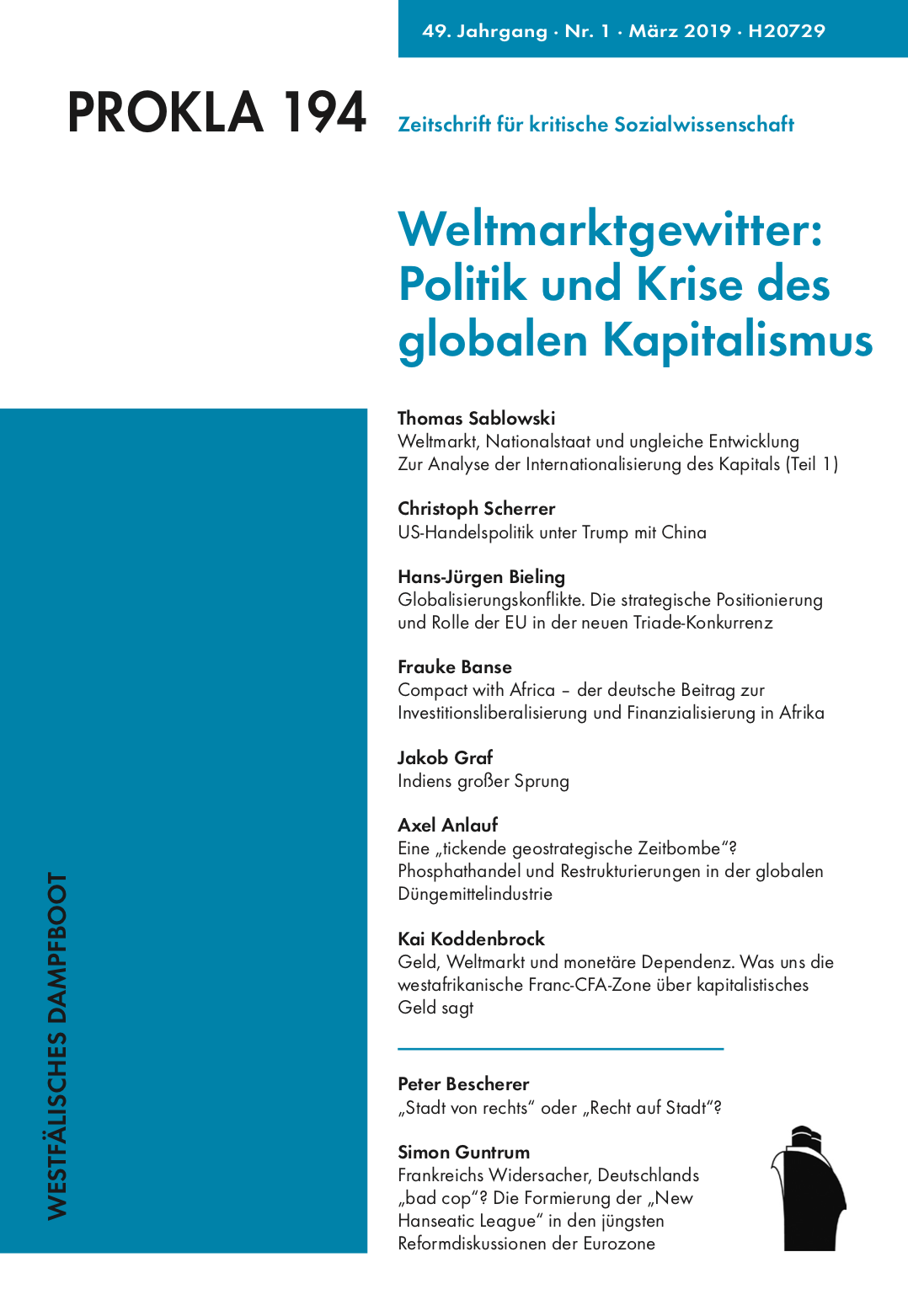Indiens großer Sprung
Über die Integration des südasiatischen Riesen in die Weltwirtschaft
DOI:
https://doi.org/10.32387/prokla.v49i194.1771Schlagworte:
Indien, Weltmarkt, Internationale Politische ÖkonomieAbstract
Indien scheint im Schatten des chinesischen Wunders zu verschwinden. Die Relevanz der indischen Wirtschaft wird jeodoch meist unterschätzt. Nicht nur wegen der schieren Bevölkerungszahl, sondern auch aufgrund seines spezifischen Entwicklungspfades ist Indien in der heutigen globalen politischen Ökonomie äußerst relevant. Der Beitrag analysiert Indiens eigenwilligen Weg der Integration in das Weltsystem. Darüber hinaus wird aufgezeigt, warum es eine permanente Produktion einer indischen "Überflussgesellschaft" gibt und wie dies zu einer krisenhaften Dynamik und sozialen Konflikten führt.
Downloads
Literaturhinweise
Acosta, Alberto (2012): Extractivismo y neoextractivismo: Dos caras de la misma maldición. In: Grupo Permanente de Trabajo sobre Alternativas al Desarrollo (Hg.): Más Allá del Desarollo. Rosa Luxemburg Stiftung. Quito: 82-118.
Ahsan, Reshad N./Mitra, Devashish (2016): Can the whole actually be greather than the sum of its parts? Lessons from India's growing economy and its evolving structur. In: Mc Millan, Margaret/Rodrik, Dani/Sepúlveda, Claudia (Hg): Structural Change, Fundamentals and Growth. A Framework on Case Studies. International Food Policy Research Institute. Washington: 39-79.
Ahuja, Ravi (2014): Informalisierung und Arbeitskämpfe in Indien. Eine zeithistorische Perspektive auf die Gegenwart. In: WSI Mitteilungen. Nr. 5: 353-360. DOI: 10.5771/0342-300X-2014-5-353.
https://doi.org/10.5771/0342-300X-2014-5-353
Atolia, Manoj u.a. (2018): Rethinking Development Policy: Deindustrialization, Servicification and Structural Transformation. IMF-Workinpaper. WP/18/223.
https://doi.org/10.5089/9781484377499.001
Barnes, Tom (2018): Making Cars in the New India. Industry, Precarity and Informality. Cambridge. DOI: 10.1017/9781108380836.
https://doi.org/10.1017/9781108380836
Barrientos, Stephanie/Gereffi, Gary/Rossi, Arianna (2011): Economic and social upgrading in global production networks: A new paradigm for a changing world. In: International Labour Review 150: 319-340. DOI: 10.1111/j.1564-913X.2011.00119.x.
https://doi.org/10.1111/j.1564-913X.2011.00119.x
Becker, Karina/Dörre, Klaus (2018): Editorial: Demokratie ohne Wachstum? In: Berliner Journal für Soziologie 28: 1-8. DOI: 10.1007/s11609-018-0369-3.
https://doi.org/10.1007/s11609-018-0369-3
Bosworth, Barry/Collins, Susan M. (2008): Accounting for Growth: Comparing China and India. In: Journal of Economic Perspectives 22(1): 45-66. DOI: 10.1257/jep.22.1.45.
https://doi.org/10.1257/jep.22.1.45
Chapman, Terri/ Saran, Samir (2018): India: Inclusive Growth and the Employment Challange. URL: www.oecd-forum.org/ , Zugriff: 30.10.2018.
CREDAI- Confederation of Real Estate Developers Association of India (2018): Traversing through the epic, predicting the curve. URL: https://credai.org/assets/upload/report_updates/traversing-through-the-epic-predicting-the-curve.pdf, Zugriff: 30.11.2018.
D'Costa, Anthony/Chakraborty, Achin (2017): The Land Question in India. State, Dispossession, and Capitalist Transition. Oxford. DOI: 10.1093/oso/9780198792444.001.0001.
https://doi.org/10.1093/oso/9780198792444.001.0001
Fröbel, Folker u.a. (1977): Die neue internationale Arbeitsteilung. Reinbek.
Galbraith, James K. (2015): The End of Normal. The Great Crisis and the Future of Growth. New York.
GoI - Government of India (2012): Report of the Committee on Unorganised Sector Statistics. National Statistical Commission. Delhi.
GoI - Government of India (2014): Agricultural Census 2010-2011. Ministry of Agriculture. Government of India. Delhi.
Gosh, Jayati (2016): Inequality in India: drivers and consequences. In: World Social Science Report 2016. UNESCO & ISSC. Paris: 89-92.
Graf, Jakob (2014): Puzzles of Indian Commodity Production. Capitalist Exploitation and Heterogeneity of Rural and Informal Sectors. URL: www.rosalux.de/, Zugriff: 1.12.2018.
ILO - International Labour Organization (2017): India Labour Market Update. URL: https://www.ilo.org/newdelhi/whatwedo/publications/WCMS_568701/lang--en/index.htm, Zugriff: 24.11. 2018.
Kadritzke, Ulf (2016): Zur Mitte drängt sich alles. Teil 1. Historische Klassenstudien im Lichte der Gegenwart. In: PROKLA (46)3: 477-496. DOI: 10.32387/prokla.v46i184.127.
https://doi.org/10.32387/prokla.v46i184.127
Kerr, Clark u.a. (1966): Der Mensch in der industriellen Gesellschaft. Die Probleme von Arbeit und Management unter den Bedingungen wirtschaftlichen Wachstums. Frankfurt/M.
Kohli, Atul (2006): Politics of Economic Growth in India 1980-2005. Part I: The 1980s. In: Economic and Political Weekly. Special Articles. April 2006: 1251-1259.
Krishnan, Sandhya/ Hatekar, Neeraj (2017): Rise of the New Middle Class in India and Its Changing Structure. In: Economic and Political Weekly Nr. 22: 40-48.
Levien, Michael (2011): Special Economic Zones and Accumulation by Dispossession in India. In: Journal of Agrarian Change 11(4): 454-483. DOI: 10.1111/j.1471-0366.2011.00329.x.
https://doi.org/10.1111/j.1471-0366.2011.00329.x
McKinsey (2017): Indias Labour Market. A New Emphasis on Gainful Employment. URL: https://www.mckinsey.com/~/media/McKinsey/Featured%20Insights/Employment%20and%20Growth/A%20new%20emphasis%20on%20gainful%20employment%20in%20India/Indias-labour-market-A-new-emphasis-on-gainful-employment.ashx, Zugriff: 1.12.2018.
Müller, Dominik (2014): Indien - Die größte Demokratie der Welt? Marktmacht, Hindunationalismus, Widerstand. Berlin.
Nachtwey, Oliver (2016): Die Abstiegsgesellschaft: Über das Aufbegehren in der regressiven Moderne. Frankfurt/M.
Nagaraj, R. (2016): Employment Boom in Construction. A Tentative Explanation. URL: http://www.igidr.ac.in/indiapolecon/temp/Paperstobepresented/R%20Nagaraj.pdf, Zugriff: 30.11.2018.
Naseemullah, Adnan (2017): Development after Statism. Industrial Firms and the Political Economy of South Asia. Cambridge. DOI: 10.1017/9781316665923.
https://doi.org/10.1017/9781316665923
Nasscom 2018: The IT-BPM Sector in India 2018. Amplify Digital. URL: https://community.nasscom.in/docs/DOC-1697, Zugriff: 23.11.2018.
Neelsen, John (2018): Indien im System des globalen Kapitalismus. ISW Report. Nr. 114. München.
Noronha, Ernesto/D'Cruz, Premilla (2016): Still a Distance to Go. Social Upgrading in the Indian ITO-BPO-KPO-Sector. In: Nathan, Dev u.a. (Hg.): Labour in Global Value Chains in Asia. Cambridge: 423-449. DOI: 10.1017/9781316217382.020.
https://doi.org/10.1017/9781316217382.020
Nasscom 2018: The IT-BPM Sector in India 2018. Amplify Digital. URL: https://community.nasscom.in/docs/DOC-1697, Zugriff: 23.11.2018.
Patnaik, Utsa (2007): Unbequeme Wahrheiten. Hunger und Armut in Indien. Heidelberg.
pwc - pricewaterhousecoopers (2015): The World in 2050. Will the shift in global economic power continue? URL: https://www.pwc.com/gx/en/issues/the-economy/assets/world-in-2050-february-2015.pdf, Zugriff: 11.1.2019.
Randeria, Shalini (2007): The State of Globalization. Legal Plurality, Overlapping Sovereignties and Ambiguous Alliances between Civil Society and the Cunning State in India. In: Theory, Culture & Society 24: 1-33. DOI: 10.1177/0263276407071559.
https://doi.org/10.1177/0263276407071559
Rothermund, Dietmar (2008): Indien. Aufstieg einer asiatischen Weltmacht. München.
Schmalz, Stefan (2018): Machtverschiebungen im Weltsystem. Der Aufstieg Chinas und die große Krise. Frankfurt/M-New York.
Rothermund, Dietmar /Ebenau, Matthias (2011): Auf dem Sprung - Brasilien, Indien und China. Zur gesellschaftlichen Transformation in der Krise. Berlin.
Sengenberger, Werner/ Pyke, Frank (1992): Industrial districts and local economic regeneration:
Research and policy issues. In: Dies. (Hg.): Industrial districts and local economic regeneration. ILO Publications. Genf: 3-29.
Svampa, Maristella (2015a): Neuer Entwicklungsextraktivismus. Regierungen und soziale Bewegungen in Lateinamerika. In: Roth, Julia (Hg.): Lateinamerikas koloniales Gedächtnis. Vom Ende der Ressourcen, so wie wir sie kennen. Baden-Baden: 153-184.
https://doi.org/10.5771/9783845261119_151
Svampa, Maristella (2015b): Commodities Consensus: Neoextractivism and Enclosure of the Commons in Latin America. In: The South Atlantic Quarterly. DOI: 10.1215/00382876-2831290.
https://doi.org/10.1215/00382876-2831290
UNCTAD - United Nations Conference on Trade and Development (2018): Global FDI Flows Slipped Further in 2017. URL: https://unctad.org/en/PublicationsLibrary/diaeia2018d1_en.pdf, Zugriff: 30.11.2018.
Virmani, Arvind u.a. (2004): Impact of Tariff Reforms on Indian Industry: Assessment Based on a Multi-Sector Econometric Model. Working Paper Nr. 135. Indian Council for Reserch on International Economic Relation. URL: http://icrier.org/pdf/wp135.pdf, Zugriff: 29.11.2018.
Yergin, Daniel/ Stanislaw, Joseph (1998): Staat oder Markt. Die Schlüsselfrage unseres Jahrhunderts. Frankfurt/Main-New York.






